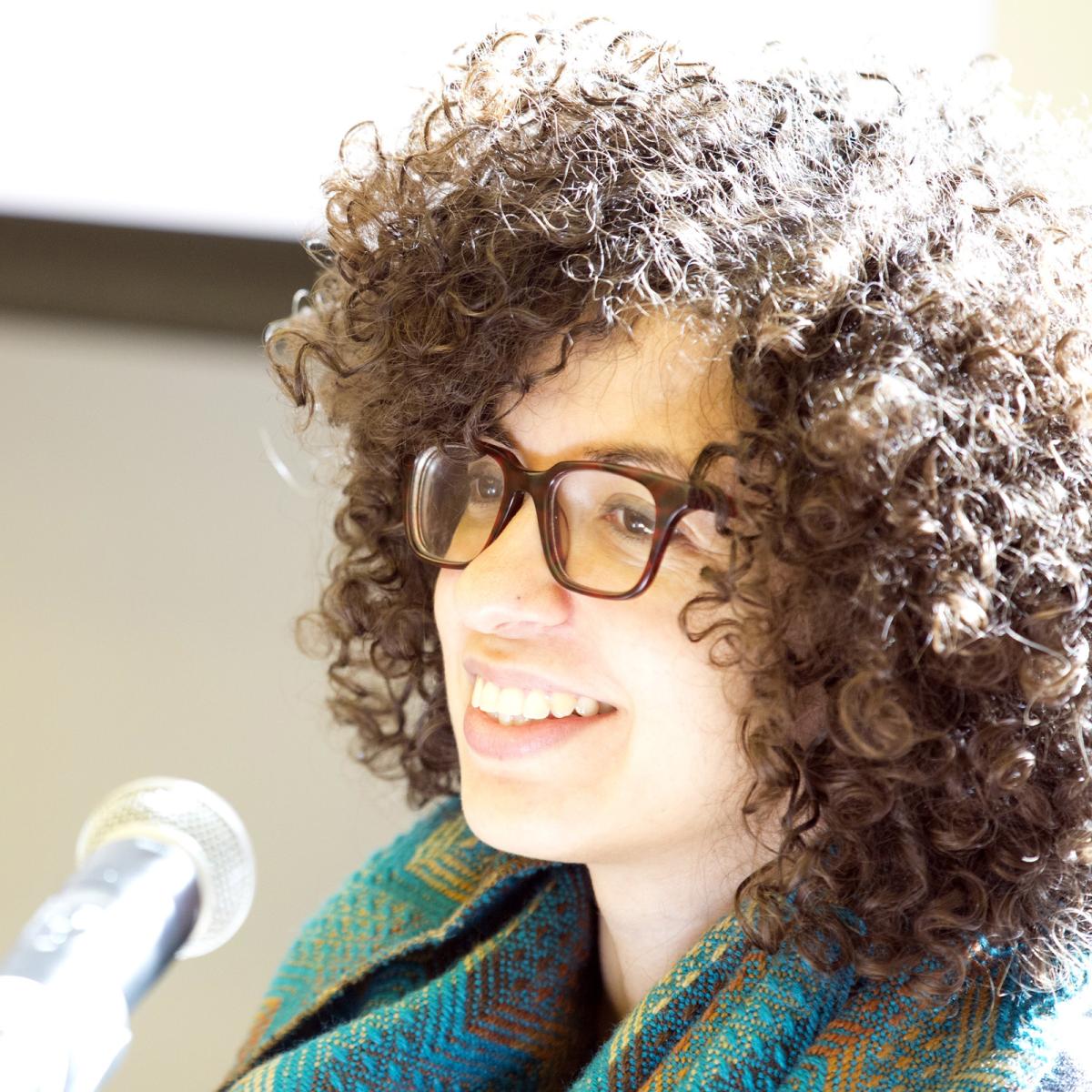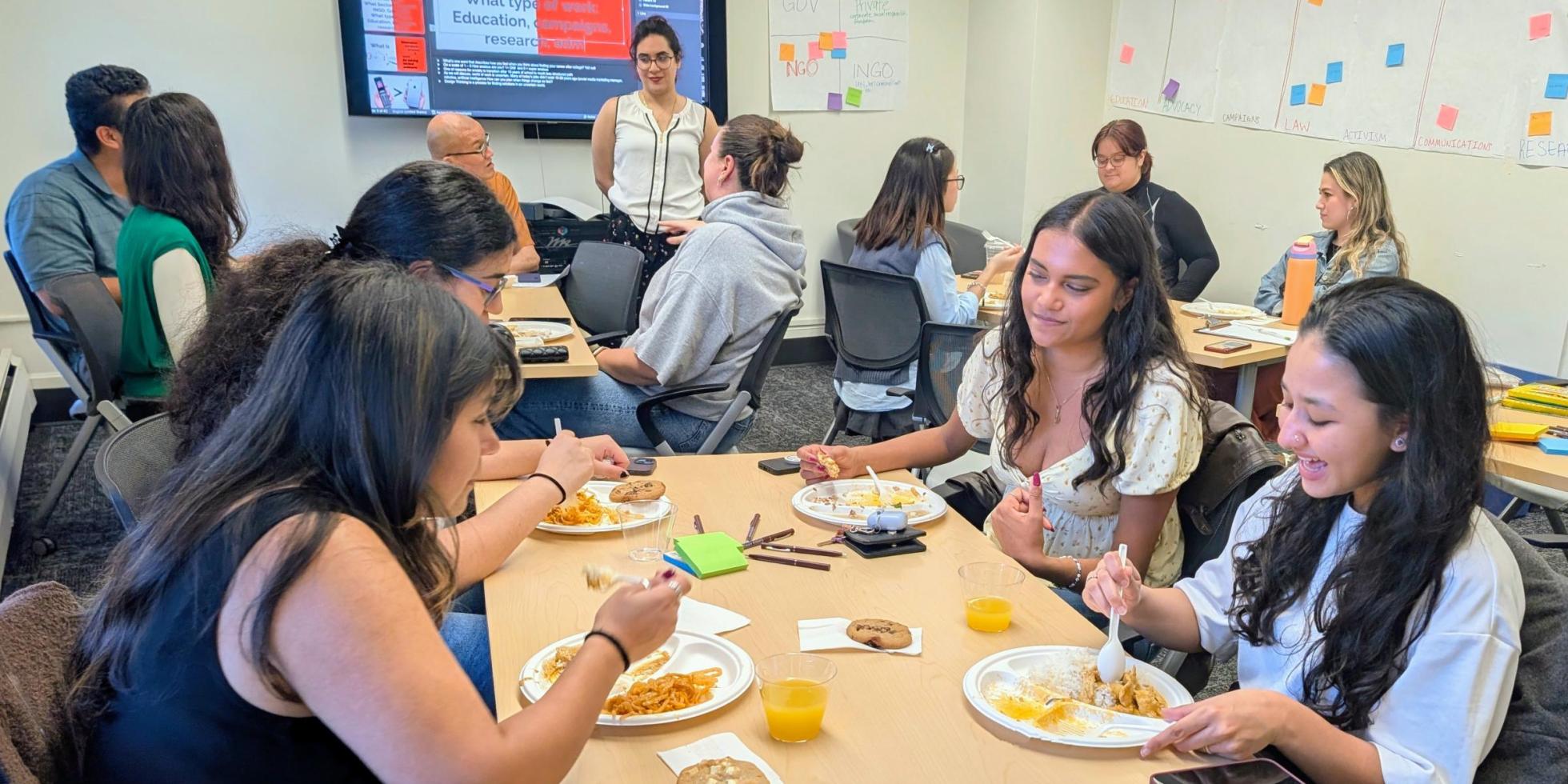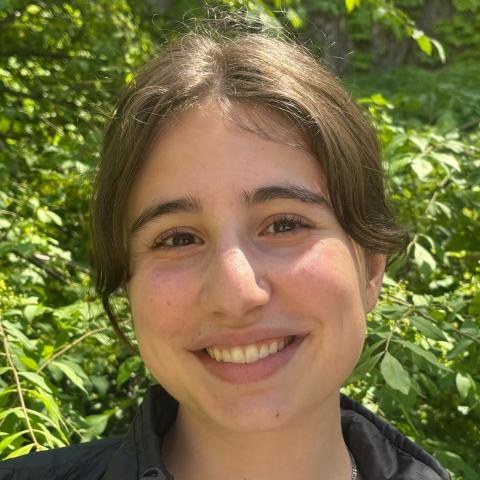
The Human Rights Summer Internship Program is an opportunity for University of Chicago students to engage with human rights in practice, supported by a flexible grant of $5,000.
Established in 1998, the selective yearlong program supports students as they search out and prepare for a full-time summer internship, and then integrate that experience into their academic coursework. Human rights majors can fulfill the fieldwork requirement through their internship.
Why do the Human Rights Summer Internship Program?
- Human Rights Framework: Address challenging human rights issues while learning practical skills and exploring career paths
- Choose Your Own Adventure: Design your own opportunity, anywhere in the world–no bidding or pre-defined menu of options
- Staff and Student Support: Receive ongoing support from the Pozen Center, Career Advancement, and Human Rights Leaders from last year’s cohort
- A Cohort Experience: Join a learning community of students with similar interests to build confidence and networks of support
- Alumni Network: Access internship leads from alumni and build skills for finding internships
SPECIAL OPPORTUNITY
Arts and Human Rights Summer Internship in Thailand
INFO SESSION: February 26 / 8 p.m. / Virtual / Register
APPLY BY: March 29
Engage members of the artist-curator-activist community in Chiang Mai to explore relevant social, political, and/or cultural human rights issues! The UChicago undergraduate selected for this internship will receive a $6,000 stipend to support their costs.
Register for Feb 26 Info Session
Eligibility
The Human Rights Internship Program is open to these UChicago students:
- Second- and third-year students in the College.
- Master’s students in the Crown Family School of Social Work, Policy, and Practice who will return to study in the academic year following their summer internship. Kiphart students in the immersive track who do the internship at the end of their program are also eligible.
- Priority is extended to students who have declared a human rights major and need the internship to satisfy the fieldwork requirement.
Program Requirements
The yearlong human rights internship program includes a variety of required program activities that facilitate learning:
- Orientation: Attend an orientation shortly after selection to mark the beginning of your program journey!
- Recorded Webinars: Review recorded webinars over Winter Break, at your own pace.
- Internship Symposium: Attend January's annual Internship Symposium to learn from last summer's interns.
- Check-ins: Brief, biweekly written check-ins during Winter Quarter.
- Advising: Attend an advising appointment with Career Advancement or Pozen Center staff before the end of January (Crown Family School students attend an appointment with UChicago GRAD).
- Training Sessions: Participate in 3-4 required training sessions during Winter and Spring Quarters:
Note: Human rights majors also take the required Winter quarter course Human Rights Fieldwork.. - Learning Plan: Complete a learning plan with a host organization by mid-April.
- Coursework: Complete one approved Human Rights course before the summer internship begins.
- Reports: Provide two brief written reflections during the summer, and a final written report at the end of your internship
- For Human Rights Majors: Keep a journal during the summer and meet with the Director of Practice after your internship
- Internship Symposium: Present at our annual Internship Symposium.
Apply
Application
Applications for the Summer 2027 internship cohort will open at the beginning of Autumn quarter and are due at the end of October. The application process is selective. Finalists will be interviewed in early November. Applicants receive a decision by mid-November. Students who have declared human rights as a major receive priority and should apply early so you don't miss out on fall internship deadlines.
Questions?
- For help with any remaining questions, please contact Assistant Director Cliff Chan.
Info Sessions
Human Rights Internship Info Session
Click the image below to hear the experience of summer 2025 interns and learn about the internship program.
Then, review our Frequently Asked Questions below and contact a Human Rights Leader with questions about applying; their names and contact information are below.
Human Rights Leader Office Hours
We welcome any questions you may have about internships or applications, from the general to the specific.
Human Rights Leaders (HRL) are former Human Rights Interns who are available to advise prospective applicants. Human Rights Leaders can review individual applications but can’t provide line-by-line edits. Note that HRLs will not be a part of the committee that evaluates submitted applications. To learn more about the HRLs, check out our Human Rights Leaders page. A new cohort is selected each September.
Human Rights Leaders hold in-person and virtual "office hours" to discuss their experiences and assist you during the internship application, search, and preparation process.
- Further questions? Contact Cliff Chan, Assistant Director of Programs and Events.
Frequently Asked Questions
Application
What are the application requirements?
Applications include student information, special skills, essay questions, and a resumé. You will be asked for 2 professional or academic references, (a professor or supervisor, not a family member or friend) who can speak to your motivation and qualifications for a human rights internship. (Human rights majors are not required to provide references)
What are the essay questions?
Question 1: Please tell us how you have demonstrated a serious interest in human rights. Include influential and formative academic work, work experiences, volunteerism, activism, personal experiences, and/or interests in particular issue areas that have (a) influenced your decision to apply and (b) prepared you for a Human Rights Internship. (500 word limit)
Question 2: Describe your ideal 8-10 week summer Human Rights Internship. Where might you work? What types of issues would you work on? Feel free to include specific tasks that could be accomplished as part of your ideal internship and what you would gain from the experience. Reflect upon one or two challenges you could potentially encounter as well. How would you address these challenges? (750 word limit)
Question 3: Explain which of your talents, skills, and/or insights could most enhance the Human Rights Internship experience for yourself and others in the program (volunteer experiences to share, or experience with social media campaigns, organizing online petitions, etc.). Conversely, are there personal and professional areas where you’re looking to grow? (250 word limit)
How specific should I be in responding to Essay Question #2?
Be flexible and realistic. The committee is interested in your capacity to describe a human rights issue or geographic area where you might want to work. The selection committee wants to see your ability to plan a tangible, feasible project. You may suggest some organizations or types of organizations that interest you, but identifying a specific host organization is not necessary for the application. Your answers can be as specific as you want them to be—but a lot can happen between now and when you secure your placement!
How should I format my application for online submission?
The applications are submitted online through a web form; to avoid formatting errors, we strongly encourage you to draft your essay responses in plain text on your computer and then copy/paste them into the web form. We recommend that you use a plain text editor to save your essay responses, use your regular word processor and “Save As” plain text (.txt), and use block paragraphs (i.e. a line between paragraphs instead of indented paragraphs) to separate text.
What is the selection committee looking for?
Above all, the committee is looking for maturity and flexibility. Strong candidates often have a history of engagement in activism or involvement with social justice, although formal work experience is not necessary. Candidates should be familiar with human rights principles and be able to propose a realistic project for an 8-10 week full-time summer internship.
Who is on the committee? What will the interview be like?
If you are chosen for the interview round, you will be interviewed on Zoom by staff from the Pozen Center and Career Advancement who are knowledgeable about human rights issues and organizations. Interviews are relatively short (about 15 to 20 minutes), and you don’t need to prepare anything beforehand. Casual or business casual attire is fine.
Is there anyone who can offer help with the application process?
Human Rights Leaders (past interns with firsthand experience of the process) are available to answer questions and provide feedback on application materials during office hours or by appointment. They will refer questions to the staff as needed. Human Rights Leaders are not part of the decision-making process when submitted applications are evaluated. See above for information about office hours.
When will selection decisions be announced?
Applicants will receive an email the first week of November indicating whether they will be invited to a final round interview with members of the Human Rights Internship Selection Committee. Interviews will take place in early November, and applicants will be notified of the results by mid-November. Selected candidates are expected to attend the Internship Orientation later that month.
How is the process different for human rights majors?
Human rights majors receive priority during the selection process since they need to fulfill the major's fieldwork requirement. They are not required to submit the names of two references. We recommend taking the human rights fieldwork course required for the major during the Winter Quarter before your internship. Human rights majors in the internship program during their third year often can more easily tie their internship experience to their BA thesis or capstone project, but students are permitted to fulfill their fieldwork requirement in the summer after their second year. (Students who are not human rights majors are welcome to apply to the internship program.)
Eligibility
I have not taken an HMRT course with the Pozen Center. Will that hurt my chances as an applicant?
Interns come from various backgrounds and should be able to demonstrate a serious interest in human rights. Previous human rights coursework often helps provide some of that background, but it is not required to apply. However, selected interns are required to take at least one approved human rights course at some point before the start of their internship.
I have experience in ____, but I don’t know if it qualifies as “human rights.”
The definition of “human rights” is constantly under debate. Strong applications do not just define the problem in terms of human rights, but also conceive of the solution in a human rights framework. We recommend that you consider the intersection between your interests and material in the Universal Declaration of Human Rights, other international human rights instruments, or human rights scholarship. Consider how your proposed internship differs from a typical research or service project. Demonstrate that you have considered how your previous and/or future work furthers the field of human rights.
I have experience in ____, but I am interested in exploring a new topic or region. Is this okay?
It could be! Strong candidates are able to explain the connection between their past experience and a proposed project. Some students use the internship to deepen their interest in a certain topic or region, and others use it to explore a new but related topic, strategy, or place.
I applied to the program last year, as a second-year, and wasn’t chosen. Does that mean I can’t apply this year (or that I shouldn’t bother trying again)?
Absolutely not! We encourage you to apply again as a third-year. The experience of applying to a selective program and the work those candidates do during the intervening year puts them in an even better position to apply as third-years.
Can graduate students apply?
Students currently earning a master’s degree at the Crown Family School of Social Work, Policy, and Practice can complete internships in the first summer of their graduate study or as part of the Kiphart Scholars Program immersive track five-month placement. We recommend that graduate students in other divisions and programs explore the Graduate Global Impact Internship Program and the other excellent resources offered through UChicago GRAD.
Can first-year or fourth-year College students apply?
No. Only second and third-year students in the College are eligible for the program. Because the application process is selective, most successful candidates are third-year students, with a limited number of slots in each cohort often secured by second-year students.
Can I use the grant to fund an independent, personal, or research initiative?
No. The selection committee is looking for a proposal that involves supervision from a non-governmental or not-for-profit organization, government agency, international body, social movement organization, or similar entity.
Placements
After interns are selected, how do the internship search and placement work?
Some interns choose to work with organizations that have hosted our students in the past, while others seek out new placements. For assistance and accountability throughout the search process, each awardee will have access to the Human Rights Leaders, in addition to staff from the Pozen Center and Career Advancement. Program alumni can also be an invaluable resource in finding ideal host organizations.
Can I see a list of past intern placements?
If you are selected for this year’s cohort, a password-protected section of our website will be made available to you. This section allows you to search the list of past internship host organizations by name, region, or topic, and to look at past intern profiles to see the types of projects they worked on during their internships. We also encourage you to contact one of the Human Rights Leaders for any additional help.
Does the selection committee have a preference for students going abroad for their internships, or can I pursue something domestic?
No preference is given to those who plan to go abroad. Each year, up to two-thirds of the internship cohort chooses to work in the U.S.
Are there any countries that are off-limits for travel?
All internship placements (including the host organization and location) must be approved by the Pozen Center. College students who are considering travel to countries with a U.S. State Department Travel Advisory are also required to file a petition through the annual Study Abroad Risk and Security Assessment Committee (SARSAC). SARSAC has approved some petitions in the past, but not all. While each case is different, we generally encourage students filing petitions to work on an alternate plan in case their proposed travel is not approved.
Human Rights Interns are responsible for securing the appropriate visa before starting their internship. The Pozen Center will provide appropriate verification for visa applications, as needed. All Human Rights Interns traveling outside of the U.S. are required to register their travel with UChicago Traveler. International students working in the US or working overseas for a US company should check with their international student advisor about applying for work authorization (CPT - curricular practical training)
Can you tell me more about what the program timeline looks like after I’ve been accepted?
Fall Quarter: Once accepted, new interns attend the Internship Orientation held in mid-November.
Winter Break
- Watch at your own pace a series of recorded webinars to prepare for your internship search
- Begin developing a list of potential host organizations
Winter Quarter,
- Brainstorm ideas, contact organizations, and follow up on leads. Some students choose to intern with organizations that have hosted students in the past, while others seek out new placements.
- Take the human rights methods course (required for human rights majors, otherwise optional)
- Attend the Internship Symposium to learn from the previous summer's interns
- Contact a student Human Rights Leader from the previous year’s cohort, who can advise during the search process
- Attend one advising appointment with Career Advancement before the end of January (or UChicago GRAD for Crown Family School students) to go over job search materials and the internship search progress
- Make brief biweekly reports about your internship search, participate in two to three mandatory group trainings, and take human rights classes
- By the end of the Winter Quarter, secure a confirmed placement or have developed several strong leads.
Spring Quarter
- Develop a learning plan in collaboration with your host organization supervisors, identifying projects that fulfill your goals and the organization’s needs
- After completing the work plan, each intern is issued a check for $5,000 to cover summer expenses
- Participate in two to three required training sessions
- Finalize travel and housing plans
- Attend a send-off session to help you get the most out of your internship
- Human rights majors meet with the Director of Practice to review their learning goals
Summer
- Embark on your full-time internship lasting 8 to 10 weeks!
- Throughout the summer, join a virtual meet-up and submit two written reflections to your peers and the Pozen Center staff
- Submit a final report about your experiences
- Human rights majors keep a journal and meet with the Director of Practice to review their internship experience
- As the new academic year begins, return to campus and prepare for a presentation at the Internship Symposium held in either November or January



